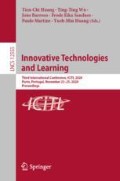Abstract
In this paper, the concept of affective learning is discussed in today’s context, in which technology plays a significant role, with the objective of developing a model of affective learning. The study is guided by Frangou’s [6] embodied knowledge construction model of affects in writing and Körkkö’s [18] holistic model of learning and guiding reflection. The models are examined and then merged to form a model of affective learning that can serve as a pedagogical framework to facilitate teaching and learning in a holistic learning environment that takes into account the learner’s motivations, interests, and experiences. In this context, the learner’s sensory and motor perceptions, together with embodied cognition, are intertwined into a technology-enhanced holistic pedagogy that considers the learner’s individual embodied learning environment. This paper concludes with discussing the model and providing ideas for future research.
Access this chapter
Tax calculation will be finalised at checkout
Purchases are for personal use only
References
Bandura, A.: Social Learning Theory. Prentice-Hall, Englewood Cliffs (1977)
Bamidis, P.D.: Affective learning: principles, technologies, practice. BFAL 2017. LNCS (LNAI), vol. 10512, pp. 1–13. Springer, Cham (2017). https://doi.org/10.1007/978-3-319-67615-9_1
Blömeke, S., Gustafsson, J., Shavelson, R.J.: Beyond dichotomies: Competence viewed as a continuum. Zeitschrift Für Psychologie 223(1), 3–13 (2015). https://doi.org/10.1027/2151-2604/a000194
Davids, K., Button, C., Bennett, S.: Dynamics of Skill Acquisition: A Constraints-led Approach. Human Kinetics, Champaign (2015)
Dewey, J.: How we think: a restatement of the relation of reflective thinking to the educative process. DC Heath and Company, Boston (1933)
Frangou, S.M.: Write to recall–An embodied knowledge construction model of affects in writing. Doctoral dissertation. University of Lapland, Rovaniemi (2020)
Hayes, J.R.: A new framework for understanding cognition and affect in writing. In: Levy, C.M., Ransdell, S. (eds.) The Science of Writing: Theories, Methods, Individual Differences and Applications, pp. 1–27. Routledge, New York, NY (1996)
Headrick, J.J.: Affective learning design: A principled approach to emotion in learning. Doctoral dissertation. Queensland University of Technology, Queensland (2015)
Hutto, D.D.: Truly enactive emotion. Emot. Rev. 4(2), 176–181 (2012). https://doi.org/10.1177/1754073911430134
Immordino-Yang, M.H.: Implications of affective and social neuroscience for educational theory. Educ. Phil. Theory 43(1), 98–103 (2011)
Immordino-Yang, M.H., Damasio, A.: We feel, therefore we learn: the relevance of affective and social neuroscience to education. Mind Brain Educ. 1(1), 3–10 (2007)
Järvilehto, T.: Feeling as knowing Part 1: emotion as reorganization of the organism-environment system. Conscious. Emot. 1, 53–65 (2000)
Kelso, J.A.S.: Cognitive coordination dynamics. In: Tshacher, W., Dauwalder, J.P. (eds.) The Dynamical Systems Approach to Cognition: Concepts and Empirical Paradigms Based on Self-Organisation, Embodiment and Coordination Dynamics, pp. 45–71. World Scientific Publishing, Singapore (2003)
Kolb, D.A.: Experiential learning: Experience as the source of learning and development. Prentice Hall, Englewood Cliffs (1984)
Korthagen, F.A.J.: Teacher education: a problematic enterprise. In: Korthagen, F.A.J., Kessels, J., Koster, B., Lagerwerf, B., Wubbels, T. (eds.) Linking Practice and Theory: The Pedagogy of Realistic Teacher Education, pp. 1–19. Lawrence Erlbaum Associates, Mahwah (2001)
Korthagen, F.A.J.: In search of the essence of a good teacher: towards a more holistic approach in teacher education. Teach. Teach. Educ. 20(1), 77–97 (2004). https://doi.org/10.1016/j.tate.2003.10.002
Korthagen, F.A.J.: Inconvenient truths about teacher learning: towards professional development 3.0. Teach. Teach. 23(4), 387–405 (2017). https://doi.org/10.1080/13540602.2016.1211523
Körkkö, M.: Beneath the Surface: Developing video-based reflective practice in the primary school teacher education programme. Doctoral dissertation. University of Lapland, Rovaniemi (2020)
LeDoux, J.: Rethinking the emotional brain. Neuron 73(4), 653–676 (2012)
Patience, A.: The art of loving in the classroom: a defence of affective pedagogy. Aust. J. Teach. Educ. (Online) 33(2), 55–67 (2008)
Shen, L., Wang, M., Shen, R.: Affective e-learning: using “emotional” data to improve learning in pervasive learning environment. J. Educ. Technol. Soc. 12(2), 176–189 (2009)
Schön, D.A.: The Reflective Practitioner: How Professionals Think in Action. Temple Smith, London (1983)
Solomon, R.C.: The philosophy of emotions. In: Lewis, M., Haviland-ones, J.M., Feldman Barrett, L. (eds.) Handbook of Emotions, 3rd edn, pp. 3–16. The Guilford Press, New York (2008)
Vygotsky, L.S.: Mind in Society: The Development of Higher Psychological Processes. Harvard University Press, Cambridge (1978)
Wilson, M.: Six views of embodied cognition. Psychon. Bull. Rev. 9(4), 625–636 (2002)
Author information
Authors and Affiliations
Corresponding author
Editor information
Editors and Affiliations
Rights and permissions
Copyright information
© 2020 Springer Nature Switzerland AG
About this paper
Cite this paper
Frangou, SM., Körkkö, M. (2020). Model of Technology Enhanced Affective Learning. In: Huang, TC., Wu, TT., Barroso, J., Sandnes, F.E., Martins, P., Huang, YM. (eds) Innovative Technologies and Learning. ICITL 2020. Lecture Notes in Computer Science(), vol 12555. Springer, Cham. https://doi.org/10.1007/978-3-030-63885-6_63
Download citation
DOI: https://doi.org/10.1007/978-3-030-63885-6_63
Published:
Publisher Name: Springer, Cham
Print ISBN: 978-3-030-63884-9
Online ISBN: 978-3-030-63885-6
eBook Packages: Computer ScienceComputer Science (R0)

